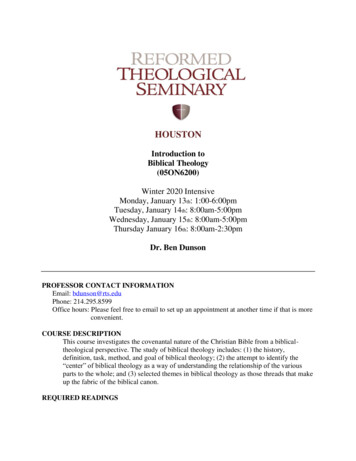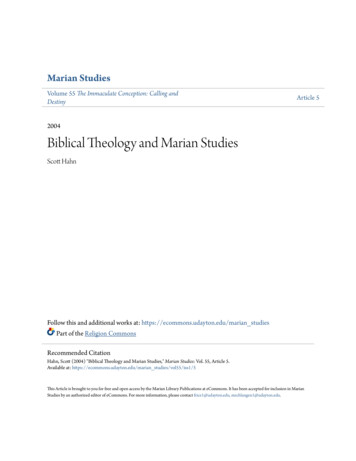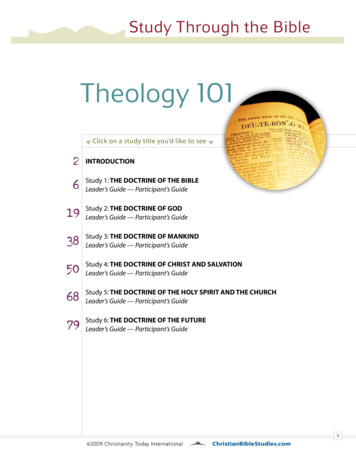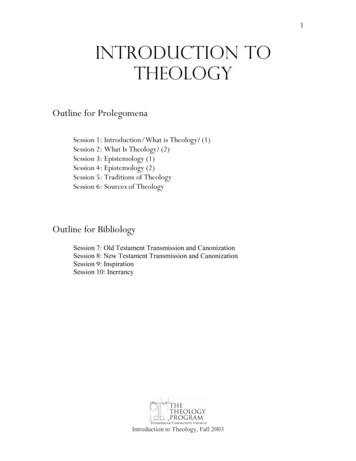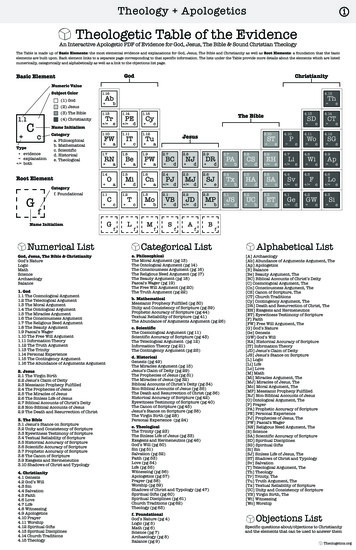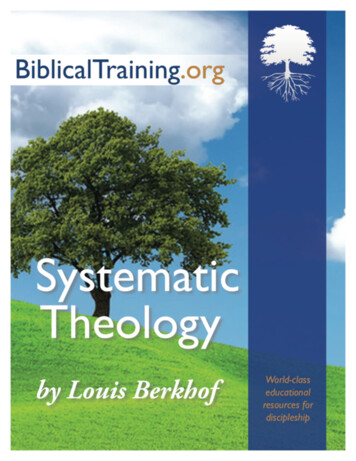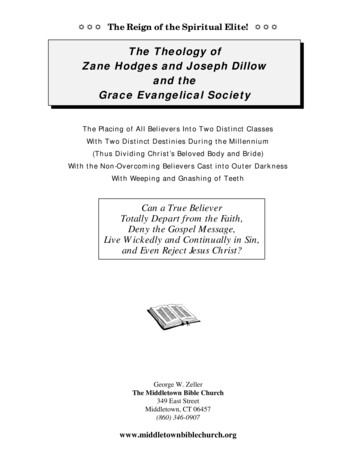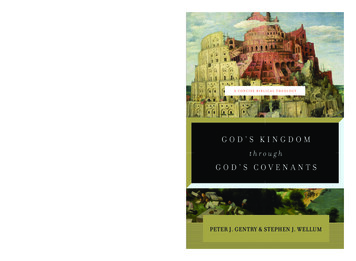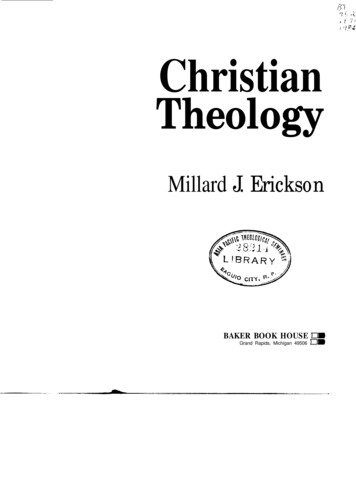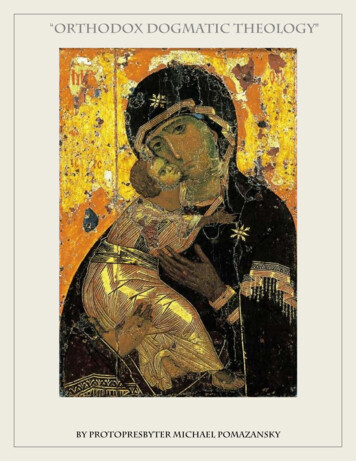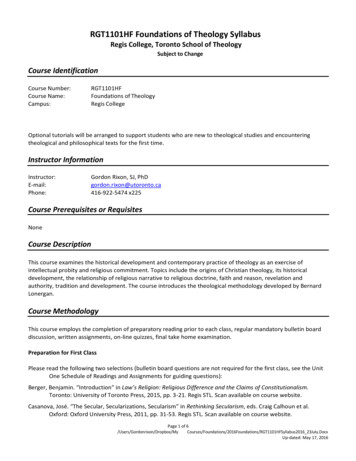
Transcription
RGT1101HF Foundations of Theology SyllabusRegis College, Toronto School of TheologySubject to ChangeCourse IdentificationCourse Number:Course Name:Campus:RGT1101HFFoundations of TheologyRegis CollegeOptional tutorials will be arranged to support students who are new to theological studies and encounteringtheological and philosophical texts for the first time.Instructor InformationInstructor:E-mail:Phone:Gordon Rixon, SJ, PhDgordon.rixon@utoronto.ca416-922-5474 x225Course Prerequisites or RequisitesNoneCourse DescriptionThis course examines the historical development and contemporary practice of theology as an exercise ofintellectual probity and religious commitment. Topics include the origins of Christian theology, its historicaldevelopment, the relationship of religious narrative to religious doctrine, faith and reason, revelation andauthority, tradition and development. The course introduces the theological methodology developed by BernardLonergan.Course MethodologyThis course employs the completion of preparatory reading prior to each class, regular mandatory bulletin boarddiscussion, written assignments, on-line quizzes, final take home examination.Preparation for First ClassPlease read the following two selections (bulletin board questions are not required for the first class, see the UnitOne Schedule of Readings and Assignments for guiding questions):Berger, Benjamin. “Introduction” in Law’s Religion: Religious Difference and the Claims of Constitutionalism.Toronto: University of Toronto Press, 2015, pp. 3-21. Regis STL. Scan available on course website.Casanova, José. “The Secular, Secularizations, Secularism” in Rethinking Secularism, eds. Craig Calhoun et al.Oxford: Oxford University Press, 2011, pp. 31-53. Regis STL. Scan available on course website.Page 1 of 2016Foundations/RGT1101HFSyllabus2016 23July.DocxUp-dated: May 17, 2016
Course ItineraryReading Schedules with assigned class preparation readings, guiding questions, suggestions for library research andother resources for each unit are available on the course website.Unit One: Beyond Encounter – Interpreting and Responding to Religious NarrativesSession 1: Reflecting on Post-Secular Religious NarrativesSession 2: Sixteenth Century Spiritual Narratives: Rhetorical Reading– The Autobiography of Ignatius of LoyolaSession 3: Sixteenth Century Spiritual Narratives: Structuralist Reading– The Life of Teresa of AvilaTransitional ClassSession 4: Contemporary Indigenous and Christian Narratives– Discovering the spiritual other, introducing Blair Stonechild, The Knowledge Seeker: EmbracingIndigenous Spirituality– Discovering self-transcending, religious agency, introducing Bernard Lonergan’s Method inTheologyUnit Two: What is Theology?Session 5: Mediation in History (Lonergan and Ronald Niezen)Session 6: Meaning (Lonergan and Charles Taylor)Reading Week: No ClassSession 7: Religion / Conversion (Lonergan and Hans Urs von Balthasar)Session 8: Foundations / Hermeneutics (Lonergan and Paul Ricoeur)Unit Three: Foundational Aspects of Religious NarrativeSession 9: Revelation and TraditionSession 10: Doctrine and DevelopmentSession 11: Faith and ReasonSession 12: Dialectic of AuthorityClass Preparation and Mandatory Bulletin Board ParticipationAttendance at class is required. Weekly reading assignments should be completed prior to each class. Studentssubmit questions based on the readings to the online course bulletin board by noon the Wednesday prior to the2:00 pm class on Thursday. Students may comment on other students’ question by the Tuesday following class.Students are not allowed to make more than three postings in any given week. The professor will review bulletinboard exchanges on a regular basis and generally respond during the class lectures.Due Dates for Written Assignments and Online Quizzes(due at beginning of session as noted below)Unit 1: Beyond EncounterSession 01: No Writing or Quiz DueSession 02: No Writing or Quiz DueSession 03: 1 Page Written AssignmentTransitional ClassSession 04: 1 Page Written AssignmentPage 2 of 2016Foundations/RGT1101HFSyllabus2016 23July.DocxUp-dated: May 17, 2016
Unit 2: What is Theology?Session 05: 1 Page Written AssignmentSession 06: Online QuizReading Week October 27: No ClassSession 07: Online QuizSession 08: No Writing or Quiz DueUnit 3: Foundational TopicsSession 09: 2 Page Written AssignmentSession 10: No Writing or Quiz DueSession 11: No Writing or Quiz DueSession 12: Online QuizExam Week: Final Take Home ExaminationDetailed instructions for each written assignment and rubrics with criteria for grading are found on the coursewebsite in the “Course Material” folder. Written assignments are submitted using the upload link thataccompanies the instructions for the assignment.Please, papers should be type-written, doubled spaced, left-justified, and have one inch margins on all sides and nomore than 12 characters per inch (ie, a standard font, size 10-12 is acceptable). Do not exceed the page limit.Extensions for assignments are to be negotiated with the professor prior to the due-date. All sources must bedocumented in accord with accepted academic practice such as that described in Kate Turabian, A Manual forWriters of Term Papers, Theses, and Dissertations, 5th Edition, Chicago: University of Chicago Press, 1987. Anexcellent guide to style is presented in Joseph M. Williams, Style: Toward Clarity and Grace, Chicago: University ofChicago Press, 1990. For additional writing assistance, consult http://www.utoronto.ca/writing/Course OutcomesBasic Program Level (MDiv and MTS): At the successful completion of this course students will havePersonal and Spiritual Formationreflected intentionally on their encounter with a religious text within its cultural/religious context;identified, articulated and assessed their intellectual and affective responses to a text;evaluated critically an account of cognitional theory, social anthropology, and religious anthropology inrelation to their own cognitive, affective and religious experience;developed pastoral agency by relating their own voice as theologians to the word spoken by the tradition;Religious Heritagedistinguished and interrelated the doctrinal and systematic functions of theology;appreciated the significance of historical consciousness for the development of a dynamic ecclesiology;analyzed and interrelated the anthropological and theological issues at stake in the development andpermanence of the doctrine of their religious heritage;Page 3 of 2016Foundations/RGT1101HFSyllabus2016 23July.DocxUp-dated: May 17, 2016
identified key moments and elements of the development of church doctrine on Revelation, Sacred Scripture,Sacred Tradition, authority and the relation of faith and reason;Cultural Contextidentified and assessed the secular/religious horizons within which they interpret texts and respond topastoral needs;identified, applied and assessed one or more approaches to interpreting texts within their cultural/religiouscontexts;identified some key characteristics of the post-Vatican II context of indigenous, Canadian and (Québec)theology;Public Leadershipcollaborated effectively in diads and small groups;identified implications of doctrine for witness to justice, ecological integrity and preferential care for youthand marginalized peoples;applied course learning to assess the pastoral need in a selected region (e.g. GTA) and propose a strategicapostolic response;Research and Scholarshipdistinguished text as data for interpretation and text as hypothetically interpreted;accessed and assessed relevant secondary literature to assist in their interpretation of texts;identified the principle terms and relations of Lonergan’s cognitional theory (including its affective andspiritual dimensions), social anthropology (including the structure of the human good and the dimensions ofmeaning) and religious anthropology (including conversion, the distinction of faith and belief, and thedifferentiation and interrelation of inner and outer word);contrasted an aspect of Lonergan’s cognitional theory, social anthropology or religious anthropology with theapproach of another theologian;distinguished spiritual, pastoral, theological and methodological reflection.Course ResourcesRequired Course TextsStudents may wish to purchase Lonergan’s Method in Theology (Toronto: University of Toronto). A limited numberof copies are available through Crux Bookstore in Wycliffe College on the lower level, entrance off Tower Road.Course Website and E-Mail CommunicationThis course uses Blackboard for its course website. To access it, go to the UofT portal login page athttp://portal.utoronto.ca and login using your UTORid and password. Once you have logged in to the portal usingyour UTORid and password, look for the My Courses module, where you’ll find the link to the website for all yourPage 4 of 2016Foundations/RGT1101HFSyllabus2016 23July.DocxUp-dated: May 17, 2016
Blackboard-based courses. (Your course registration with ROSI gives you access to the course website atBlackboard.)Are you ready to manage the learning technology required by this course?In order to enjoy the learning opportunities offered by this course, and not get too focused on the learningtechnology that is assumed from the beginning, you will need to be able to manage the following:1) PC Windows or Apple computing environment2) Web browser such as Explorer, Firefox or Safari3) Logging onto UofT resources with your UTORid and password4) Receive and send email on the University of Toronto’s @mail.utoronto.ca system5) Download course materials from Blackboard6) Post and read contributions to the course bulletin board (through Blackboard)7) Take quizzes and surveys on Blackboard8) Check assigned grades for completed work on BlackboardInstructions for some of these activities are posted below.Note also the information at ion-students. For additionalhelp, please attend the Blackboard session available through the Regis Library ASK program, further informationavailable at tsThe semester score will be allocated as follows: three online quizzes (5% each, 15% total), three 1-page papers(10% each, 30% total), one 2-page papers (25%), final take home examination (25%), bulletin board preparation(5%). Class attendance is mandatory. All semester scores are subject to review and adjustment.Grading SystemA (90-100)A (85-89)A- (80-84)B (77-79)B (73-76)B- (70-72)FailurePlease see the appropriate handbook for more details about the grading scale and non-numerical grades (e.g. SDF,INC, etc).Late work. Students are expected to hand in assignments by the date given in the course outline. Instructors arenot obliged to accept late work, except where there are legitimate, documented reasons beyond a student’scontrol. In such cases, a late penalty is normally not appropriate. If accepted, all other late work may be subjectedto a 5-mark penalty per day.Course grades. Consistently with the policy of the University of Toronto, course grades submitted by an instructorare reviewed by a committee of the instructor’s college before being posted. Course grades may be adjustedwhere they do not comply with University of Toronto grading icies/grading.htm).Page 5 of 2016Foundations/RGT1101HFSyllabus2016 23July.DocxUp-dated: May 17, 2016
PoliciesAccessibility. Students with a disability or health consideration are entitled to accommodation. Students mustregister at the University of Toronto’s Accessibility Services offices; information is available athttp://www.accessibility.utoronto.ca/. The sooner a student seeks accommodation, the quicker they can obtainassistance.Maintaining Course Enrolment. To complete registration, a student enrols in course(s) and pay fees. Courses ofstudents who have not paid fees will be automatically removed (FINCA – financially cancelled) on a specific dateeach term (see the College website for Dates to Note). If a student’s enrolment record is financially cancelled, he orshe is no longer entitled to attend classes.Plagiarism. Students submitting written material in courses are expected to provide full documentation forsources of both words and ideas in footnotes or endnotes. Direct quotations should be placed within quotationmarks. (If small changes are made in the quotation, they should be indicated by appropriate punctuation such asbrackets and ellipses, but the quotation still counts as a direct quotation.) Failure to document borrowed materialconstitutes plagiarism, which is a serious breach of academic, professional, and Christian ethics. An instructor whodiscovers evidence of student plagiarism is not permitted to deal with the situation individually but is required toreport it to his or her head of college or delegate according to the TST Basic Degree Handbook (linked fromhttp://www.tst.edu/content/handbooks) and the University of Toronto Code of Behaviour on Academic Matters(available at link below). Sanctions may include failure in an assignment, failure in a course or possible expulsionfrom the university.Students will be assumed to have read the document “Avoidance of plagiarism in theological writing” published bythe Graham Library of Trinity and Wycliffe Colleges and available at the following link(http://www.trinity.utoronto.ca/Library Archives/Theological Resources/Tools/Guides/plag.htm .The following paragraph complies with University of Toronto policy requirements for the use of online plagiarismdetection technology.“Normally, students will be required to submit their course essays to Turnitin.com for a review of textual similarityand detection of possible plagiarism. In doing so, students will allow their essays to be included as sourcedocuments in the Turnitin.com reference database, where they will be used solely for the purpose of detectingplagiarism. The terms that apply to the University’s use of the Turnitin.com service are described on theTurnitin.com web site.”Other academic offences. TST students come under the jurisdiction of the University of Toronto Code ofBehaviour on Academic Matters ehaveac.htm).Library Resources. Please do not annotate, underline or highlight library books. Marks render the books unusablefor machine readers required for student accessibility services. Students and other patrons defacing libraryresources may incur penalities including suspension of library privileges.Page 6 of 2016Foundations/RGT1101HFSyllabus2016 23July.DocxUp-dated: May 17, 2016
RGT1101HF Foundations of Theology Syllabus Regis College, Toronto School of Theology Subject to Change Course Identification Course Number: RGT1101HF Course Name: Foundations of Theology Campus: Regis College Optional tutorials will be arranged to support stu
